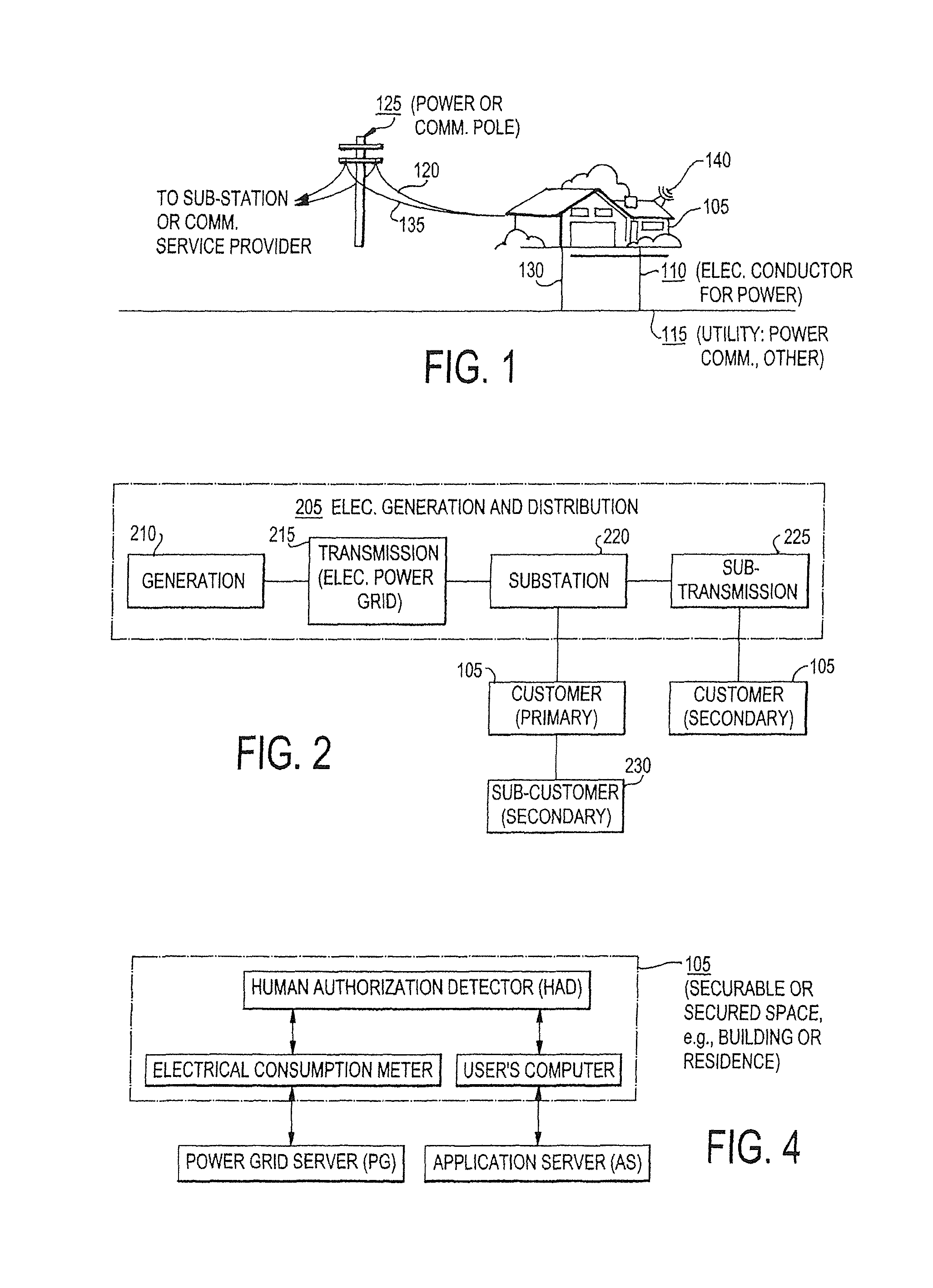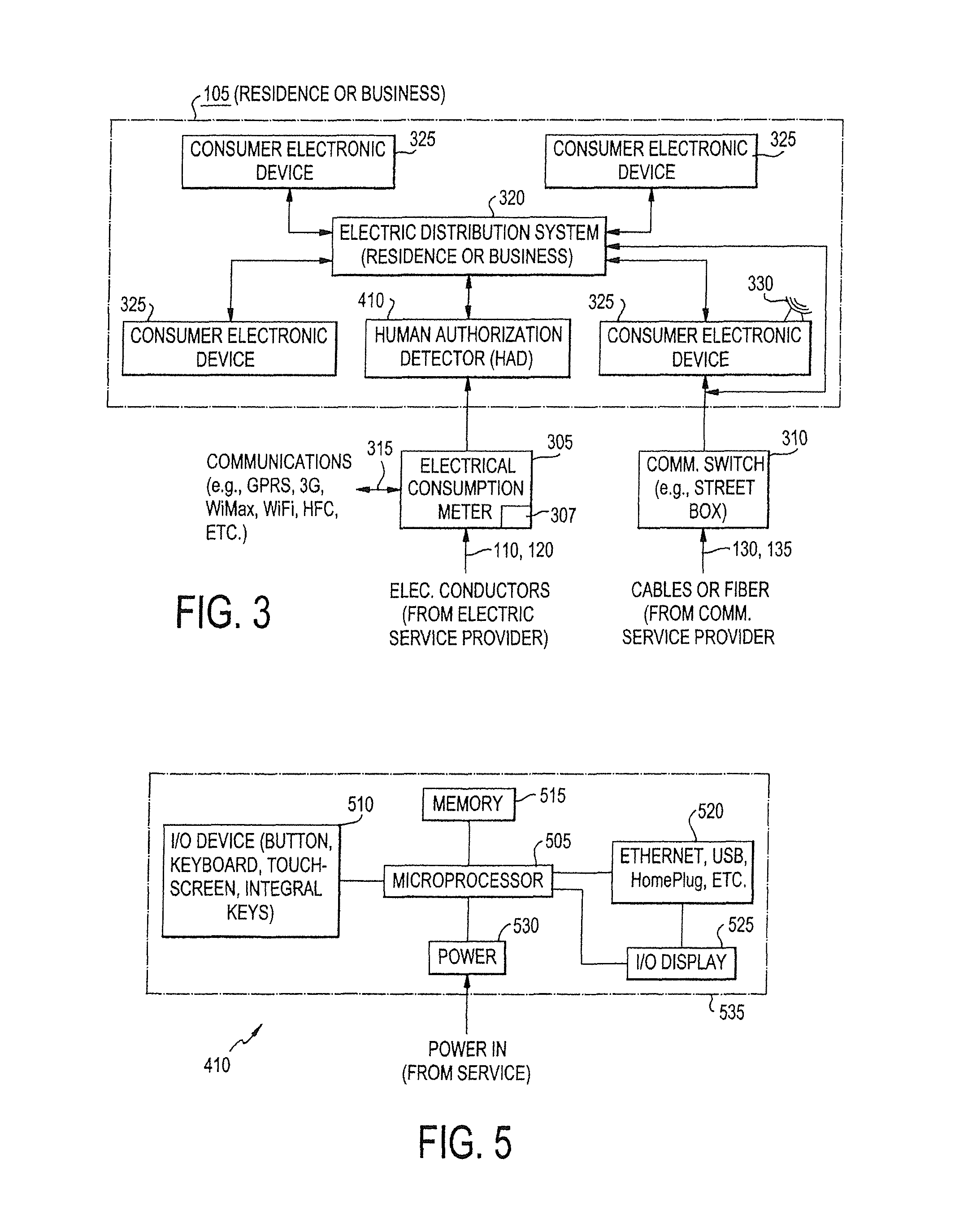System, method, and apparata for secure communications using an electrical grid network
a technology of secure communication and electrical grid, applied in powerline communications applications, process and machine control, instruments, etc., can solve the problems of inability to be certain that the computer of the end user has not been compromised, the most vulnerable components of the communication network are often the end-user's computers themselves, and the security of the communication network never was the main consideration in the design of the operating system. , to achieve the effect of reducing the cost of deployment and a marginal maintenance cost, limiting the length of the crypto
- Summary
- Abstract
- Description
- Claims
- Application Information
AI Technical Summary
Benefits of technology
Problems solved by technology
Method used
Image
Examples
example 1
Banking Transactions
[0171]The invention is described as being useful to enforce location-based access to sensitive banking transactions. Suppose, for transaction safety purposes, a user would like to put the following restriction on access to their bank account: any transaction that debits more than a threshold amount (say $100,000) must be done only from their home or other pre-approved secure location. With the electric grid communications available as a side-channel, this can be accomplished as described above. In particular, to enforce such a policy, whenever the user requests a sensitive / critical transaction, the bank (the application running at the bank on an application server 420) asks the user to “prove” that they are currently at a prior-designated / authorized safe location. A few key assertions are applicable here: the user is at the secure location (i.e., their home), they must demonstrate the following two things: (1) that the client application running on the user's com...
example 2
Device Tracking Using Power Line Anti-Theft Mechanism (PATM)
[0176]In this example, the invention is described as being useful in tracking electronic devices that require power, including, but not limited to, laptops, PDA's, mobile phones, electric transportation vehicles, etc. In this method of the invention, a mobile electronic device (in this example a consumer electronic device 325, e.g., a user's mobile computer) periodically reports its identity to the power grid server 415 through the hierarchical power line network consisting of the electric meter 305 and substation 220, while the device undergoes charging. The power grid server 415 finds the location of the electronic (mobile) device 325 based on a reported identity of the electric meter 305. The power grid server 415 creates and signs the location certificate (LocCert) containing a current location of the device and the device identity, and sends that information to a device tracking server (DT) 1005 (FIG. 10).
[0177]The dev...
example 3
Emergency Signaling
[0201]In this example, the invention is described as being useful for emergency signaling. Residential and business alarm monitoring services provided to residences and businesses, typically utilize land lines and / or wireless signals to communicate to a monitoring facility the status of contact, pressure, and infrared sensors, the status of controller boards, and the presence of alarm conditions, etc. Such systems would be more reliable by also communicating via power lines. Thus, in an emergency, a critical message could be sent via as many channels as possible, not just a single line, which could be compromised by cutting lines and jamming cellular signals.
[0202]In current state-of-the-art, power line communication is bidirectional. By exploiting the use of two-way power line communications, a smart grid can be used as a platform for advanced services like power monitoring and emergency signaling. Home monitoring, fire monitoring, and power monitoring systems ca...
PUM
 Login to View More
Login to View More Abstract
Description
Claims
Application Information
 Login to View More
Login to View More - R&D
- Intellectual Property
- Life Sciences
- Materials
- Tech Scout
- Unparalleled Data Quality
- Higher Quality Content
- 60% Fewer Hallucinations
Browse by: Latest US Patents, China's latest patents, Technical Efficacy Thesaurus, Application Domain, Technology Topic, Popular Technical Reports.
© 2025 PatSnap. All rights reserved.Legal|Privacy policy|Modern Slavery Act Transparency Statement|Sitemap|About US| Contact US: help@patsnap.com



